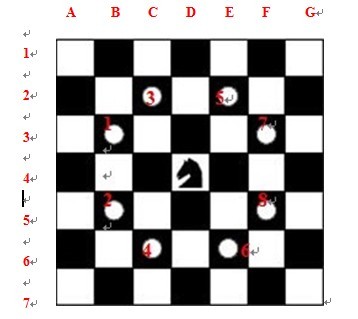题目链接http://noi.openjudge.cn/ch0205/1490/
描述 Background
Background
The knight is getting bored of seeing the same black and white squares again and again and has decided to make a journey
around the world. Whenever a knight moves, it is two squares in one direction and one square perpendicular to this. The world of a knight is the chessboard he is living on. Our knight lives on a chessboard that has a smaller area than a regular 8 * 8 board, but it is still rectangular. Can you help this adventurous knight to make travel plans?
Problem
Find a path such that the knight visits every square once. The knight can start and end on any square of the board.输入The input begins with a positive integer n in the first line. The following lines contain n test cases. Each test case consists of a single line with two positive integers p and q, such that 1 <= p * q <= 26. This represents a p * q chessboard, where p describes how many different square numbers 1, . . . , p exist, q describes how many different square letters exist. These are the first q letters of the Latin alphabet: A, . . .输出The output for every scenario begins with a line containing "Scenario #i:", where i is the number of the scenario starting at 1. Then print a single line containing the lexicographically first path that visits all squares of the chessboard with knight moves followed by an empty line. The path should be given on a single line by concatenating the names of the visited squares. Each square name consists of a capital letter followed by a number.
If no such path exist, you should output impossible on a single line.样例输入
3 1 1 2 3 4 3
样例输出
Scenario #1: A1 Scenario #2: impossible Scenario #3: A1B3C1A2B4C2A3B1C3A4B2C4
来源TUD Programming Contest 2005, Darmstadt, Germany
WA:
刚开始思路就错了,我想的是遍历所有的位置,看最后遍历到的总数是不是P*Q。事实上,只要是遍历,最后的结果都是P*Q
这里其实是搜索出一条路径
#include<cstdio> #include<cstdlib> #include<cstring> #include<iostream> #include<algorithm> #include<string> #include<vector> #define DEBUG(x) cout<<#x<<" = "<<x<<endl using namespace std; int P,Q; int visited[10][10]; int dirx[]={-1,-2,-2,-1,+1,+2,+2,+1}; int diry[]={-2,-1,+1,+2,-2,-1,+1,+2}; int cnt=0; void dfs(int i,int j) { if(i<0||j<0||i>=P||j>=Q)return; if(visited[i][j])return ; visited[i][j]=1; cnt++; DEBUG(i); DEBUG(j); printf(" "); for(int k=0;k<8 ;k++ ){ int ii=i+dirx[k]; int jj=j+diry[k]; dfs(ii,jj); } } int main() { freopen("in.txt","r",stdin); int t; scanf("%d",&t); int n=1; while(t--){ scanf("%d%d",&P,&Q); for(int j=0;j<Q ;j++ ){ for(int i=0;i<Q ;i++ ){ memset(visited,0,sizeof(visited)); cnt=0; dfs(i,j); DEBUG(i); DEBUG(j); DEBUG(cnt); printf(" "); } } } }
AC:
刚开始还是不停的WA,搜了一下,发现原因了
题目要求以"lexicographically"方式输出,也就是字典序...要以字典序输出路径,那么搜索的方向(我的程序是path()函数)就要以特殊的顺序排列了...这样只要每次从dfs(A,1)开始搜索,第一个成功遍历的路径一定是以字典序排列...
下图是搜索的次序,马的位置为当前位置,序号格为测试下一步的位置的测试先后顺序
按这个顺序测试,那么第一次成功周游的顺序就是字典序

#include<cstdio> #include<cstdlib> #include<cstring> #include<iostream> #include<algorithm> #include<string> #include<vector> #define DEBUG(x) cout<<#x<<" = "<<x<<endl using namespace std; int P,Q; int visited[30][30]; //int dirx[]={-1,-2,-2,-1,+1,+2,+2,+1}; //int diry[]={-2,-1,+1,+2,-2,-1,+1,+2}; int dirx[]={-1,+1,-2,+2,-2,+2,-1,+1}; int diry[]={-2,-2,-1,-1,+1,+1,+2,+2}; struct Pos{ int x; int y; }; Pos path[30]; bool dfs(int i,int j,int step) {///已经走了step步,从i,j出发,看是否成功 if(step==P*Q)return true; if(i<0||j<0||i>=P||j>=Q)return false; if(visited[i][j])return false; visited[i][j]=1; path[step].x=i; path[step].y=j; for(int k=0;k<8 ;k++ ){ int ii=i+dirx[k]; int jj=j+diry[k]; if(dfs(ii,jj,step+1))return true; } visited[i][j]=0; return false; } int main() { // freopen("in.txt","r",stdin); int t; scanf("%d",&t); int n=1; while(t--){ scanf("%d%d",&P,&Q);///P代表数字,Q代表字母,P行Q列 memset(visited,0,sizeof(visited)); bool f=false; for(int j=0;j<Q ;j++ ){ for(int i=0;i<P ;i++ ){ if(dfs(i,j,0)){ f=true; break; } } if(f)break; } printf("Scenario #%d: ",n++); if(f){ for(int i=0;i<P*Q ;i++ ){ printf("%c%d",path[i].y+'A',path[i].x+1); } } else printf("impossible"); printf(" "); } }
参考文献
https://blog.csdn.net/lyy289065406/article/details/6647666